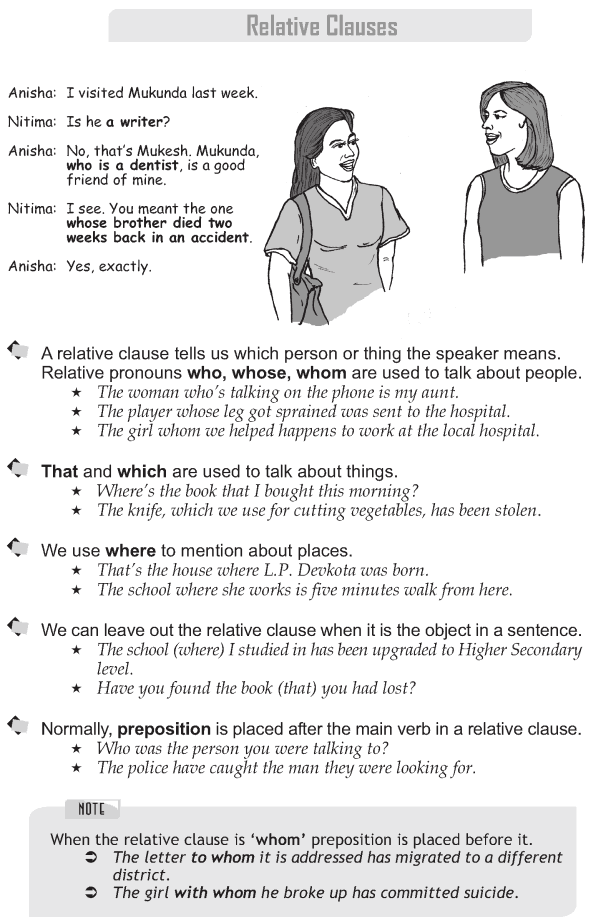Learn English

**Some people claim that we should not use "that" for people but must use "who/whom". There is no good reason for such a claim; there is a long history of "that" for people in defining relative clauses from Chaucer, Shakespeare and the Authorized Version of The Bible to Fowler's and Churchill.
- Day 15
...
- Beethoven
MAHARANI KHANSA - 120221414982 [ Diamond Shape ] Beethovenwas agreat musician. ...
- Learning Nouns In English
A noun is the name of a person, place, thing or quality. Nouns are divided into five parts: 1. Proper Nouns 2. Common Nouns ...
- Use Of Non-finites - Part - 5
Some More Uses of Infinitive:- Along with ?too? and ?enough?:- a. He is too fat to run. b. He is fast enough to win. c. Patient is too weak to walk. To combine two sentences:- a. He is vey nice. He cannot do bad works. He is too nice...
- Adjective Clauses Overview
Relative Clauses - Adjective clauses View more presentations from phricee This slide show should help learners to figure out where and when to use adjective clauses. This includes when to use the pronouns in the subject and object places in an adjective...
Learn English
Relative Pronouns (Defining / Non-Defining) Exercises
A relative pronoun is a pronoun that introduces a relative clause. It is called a "relative" pronoun because it "relates" to the word that its relative clause modifies. Here is an example:
- The person who phoned me last night is my teacher.
In the above example, "who":
- relates to "The person", which "who phoned me last night" modifies
- introduces the relative clause "who phoned me last night"

There are five relative pronouns: who, whom, whose, which, that*
Who (subject) and whom (object) are generally only for people. Whose is for possession.Which is for things.
That can be used for things and people only in defining relative clauses (clauses that are essential to the sentence and do not simply add extra information).**
Relative pronouns can refer to singular or plural, and there is no difference between male and female.
Look at these examples showing defining and non-defining relative clauses:
example sentences S=subject, O=object, P=possessive | notes | ||
defining relative clauses | S | - The person who phoned me last night is my teacher. - The person that phoned me last night is my teacher. | "that" is preferable |
- The car which hit me was yellow. - The car that hit me was yellow. | "that" is preferable | ||
O | - The person whom I phoned last night is my teacher. - The people who I phoned last night are my teachers. - The person that I phoned last night is my teacher. - The person I phoned last night is my teacher. | "whom" is correct but formal relative pronoun is optional | |
- The car which I drive is old. - The car that I drive is old. - The car I drive is old. | "that" is preferable to "which" relative pronoun is optional | ||
P | - The student whose phone just rang should stand up. - Students whose parents are wealthy pay extra. | ||
- The police are looking for the carwhose driver was masked. - The police are looking for the car of which the driver was masked. | "whose" can be used with things "of which" is also possible | ||
non-defining relative clauses | S | - Mrs Pratt, who is very kind, is my teacher. | |
- The car, which was a taxi, exploded. - The cars, which were taxis, exploded. | |||
O | - Mrs Pratt, whom I like very much, is my teacher. - Mrs Pratt, who I like very much, is my teacher. | "whom" is correct but formal "who" is common in spoken English and informal written English | |
- The car, which I was driving at the time, suddenly caught fire. | |||
P | - My brother, whose phone you just heard, is a doctor. | ||
- The car, whose driver jumped out just before the accident, was completely destroyed. - The car, the driver of which jumped out just before the accident, was completely destroyed. | "whose" can be used with things "of which" is also possible | ||
*Not all grammar sources count "that" as a relative pronoun.
**Some people claim that we should not use "that" for people but must use "who/whom". There is no good reason for such a claim; there is a long history of "that" for people in defining relative clauses from Chaucer, Shakespeare and the Authorized Version of The Bible to Fowler's and Churchill.
- Day 15
...
- Beethoven
MAHARANI KHANSA - 120221414982 [ Diamond Shape ] Beethovenwas agreat musician. ...
- Learning Nouns In English
A noun is the name of a person, place, thing or quality. Nouns are divided into five parts: 1. Proper Nouns 2. Common Nouns ...
- Use Of Non-finites - Part - 5
Some More Uses of Infinitive:- Along with ?too? and ?enough?:- a. He is too fat to run. b. He is fast enough to win. c. Patient is too weak to walk. To combine two sentences:- a. He is vey nice. He cannot do bad works. He is too nice...
- Adjective Clauses Overview
Relative Clauses - Adjective clauses View more presentations from phricee This slide show should help learners to figure out where and when to use adjective clauses. This includes when to use the pronouns in the subject and object places in an adjective...
